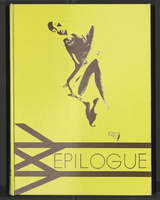Search the Special Collections and Archives Portal
Search Results
Thalia Dondero oral history interview
Identifier
Abstract
Oral history interview with Thalia Dondero conducted by Claytee D. White on 2014 March 6 and April 2 for the Boyer Early Las Vegas Oral History Project. In her interview Dondero discusses community organizing in early Las Vegas, Nevada during the 1960s. Dondero also talks about her time in the state legislature.
Archival Collection
Marla Letizia oral history interview
Identifier
Abstract
Oral history interview with Marla Letizia conducted by Barbara Tabach on August 26, 2015 for the Southern Nevada Jewish Heritage Project. Letizia discusses living in Las Vegas, Nevada since the age of two. She talks about her activity in the Jewish community, owning the Letizia Agency with her husband, and the mobile billboards business.
Archival Collection
Laura Sussman and Wendy Kraft oral history interview
Identifier
Abstract
Oral history interview with Laura Sussman and Wendy Kraft conducted by Barbara Tabach on February 17, 2016 for the Southern Nevada Jewish Heritage Project. Sussman and Kraft talk about being business partners in Kraft-Sussman Funeral Home, which caters to the Jewish community. They also talk about the local LGBT community as a lesbian couple.
Archival Collection
Regional subject files, 1859, 1908, 1970-2015
Level of Description
Scope and Contents
The regional subject files include materials collected by anthropologist Katherine Spilde about Native American gaming, Native American communities in the United States, and the US and international gaming industries. The materials date from 1859 to 2015, with the bulk of materials dating from 1990 to 2010. Materials dating from the nineteenth and early twentieth centuries are a reproduction of a federal treaty and an ethnohistorical essay. The majority of the materials document Native American gaming following the passage of the 1988 Indian Gaming Regulatory Act. The papers include research and subject files created by Dr. Spilde during her employment with the National Gambling Impact Study Commission (NGISC), National Indian Gaming Association (NIGA), and Harvard Project on American Indian Economic Development (HPAIED). The materials document Native American gaming enterprises both on and off reservations, the socioeconomic impact of gaming, the political history of gaming in the US, and international gaming. The series includes socioeconomic reports, testimonies, correspondence, memos, press releases, photographs, audiovisual materials, promotional materials, brochures, fact sheets, summaries, booklets, pamphlets, advertisements, tourism materials, journal articles, legal briefs, legislative documents, court opinions, notes, presentations, conference materials, periodicals, community newspapers, and newspaper articles.
The collection contains documentation on a number of Native American nations, including the Misi-zaaga'iganiing Anishinaabeg (Minnesota Chippewa Tribe, Mille Lacs Band); Gaa-waabaabiganikaag Anishinaabeg (Minnesota Chippewa Tribe, White Earth Band); Forest County Bodéwadmi (Forest County Potawatomi Community); Ho-Chunk Nation of Wisconsin; Mashantucket Pequot Indian Tribe; Mohegan Tribe of Indians; Tulalip Tribes of Washington; Sisseton-Wahpeton Oyate of the Lake Traverse Reservation; Standing Rock Sioux Tribe of North and South Dakota; Mandan, Hidatsa, and Sahnish (Arikara) (Three Affiliated Tribes of the Fort Berthold Reservation, North Dakota); and Mississippi Band of Choctaw Indians. Other communities are also represented in the series, but to a lesser extent. In addition to materials about gaming and casinos, Dr. Spilde also collected documents, photographs, and audiovisual materials about Native American culture in general. The series documents regional and national trends in Native American gaming, and the greater gaming industry. Materials trace federal and state relationships with individual Native American nations, specifically concerning gaming enterprises.
Archival Collection
Collection Name: Katherine A. Spilde Papers on Native American Gaming
Box/Folder: N/A
Archival Component

Epilogue: UNLV Yearbook, 1972
Date
Description
Yearbook main highlights: schools and departments; detailed lists with names and headshots of faculty, administration and students; variety of photos from activities, festivals, campus life, and buildings; campus organizations such as sororities, fraternities and councils; beauty contest winners; college sports and featured athletes; and printed advertisements of local businesses; Institution name: University of Nevada, Las Vegas
Mixed Content

Meeting minutes for Consolidated Student Senate University of Nevada, Las Vegas, February 9, 1989
Date
Archival Collection
Description
Text

Irene Bustamante Adams oral history interview: transcript
Date
Archival Collection
Description
Oral history interview with Irene Bustamante Adams conducted by Monserrath Hernández and Claytee D. White on May 13, 2020 for the Latinx Voices of Southern Nevada Oral History Project. Irene discusses her personal history, her culture and family traditions, and her previous employment. She also talks about her time in Las Vegas and how she came to be a representative for District 42 in the Nevada Assembly. Subjects discussed include: Migrant Farmworkers; California; Mexican culture; Equal Opportunity Program.
Text

Amy Bush Herzer oral history interview: transcript
Date
Archival Collection
Description
Oral history interview with Amy Bush Herzer conducted by Barbara Tabach on November 14, 2019 for the Remembering 1 October Oral History Project. Herzer begins the interview discussing her early life, education, and her current job as the University of Nevada, Las Vegas (UNLV) women's golf coach. She speaks about her family's history with golf, her personal history, and life with her husband, Kendall Herzer. After, she recalls where she was on the day of the October 1 shooting, and how she found out about the event, and recalls her husband reported to the main fire station as an Emergency Manager for the State of Nevada. She recalls keeping track of her athletes' whereabouts and letting their families know. Herzer describes how people reacted when she had brought a therapy dog, Apollo, in for the people donating blood and how the community came together to support each other and share resources as a community.
Text

Mariteresa Rivera-Rogers oral history interview: transcript
Date
Archival Collection
Description
Oral history interview with Mariteresa Rivera-Rogers conducted by Maribel Estrada Calderón on October 24, 2018 for the Latinx Voices of Southern Nevada Oral History Project. In this interview, Mariteresa discusses her early life in Concepción, Chile. She talks about her experience moving to Las Vegas, Nevada in 1965, the immigration process at the time, and becoming a Spanish language court interpreter. Rivera-Rogers recalls enrolling at the University of Nevada, Las Vegas' (UNLV) Sam Boyd School of Law, and her involvement with the Latino Bar Association. Lastly, Rivera-Rodgers discusses the challenges in translating Spanish language to English.
Text

Transcript of interview with Jarmilla McMillan-Arnold by Claytee D. White, October 7, 2010
Date
Archival Collection
Description
Jarmilla McMillan-Arnold’s father, Dr. James B. McMillan, was the first black dentist in the state of Nevada. Dr. McMillan’s colleagues consisted of Dr. West, the first black medical doctor in the state, and Dr. Ice, the first black surgeon in Nevada. This interview highlights and archives the solid foundation upon which Nevada’s black community was built. Jarmilla recalls early memories of growing up as the daughter of Las Vegas NAACP president Dr. McMillan. She was born in Detroit, Michigan, to a Caucasian and Indian mother who was a professional dancer. Jarmilla’s parents separated when she was very young and as a result she was raised by her paternal grandmother who owned a restaurant in Pontiac, Michigan. Jarmilla describes her grandmother as being well-known and highly regarded in the community where she maintained her business. Jarmilla attended Catholic schools in Detroit, Pontiac, and Las Vegas. Having moved to Las Vegas with her father, Jarmilla’s narrative offers keen insigh
Text
